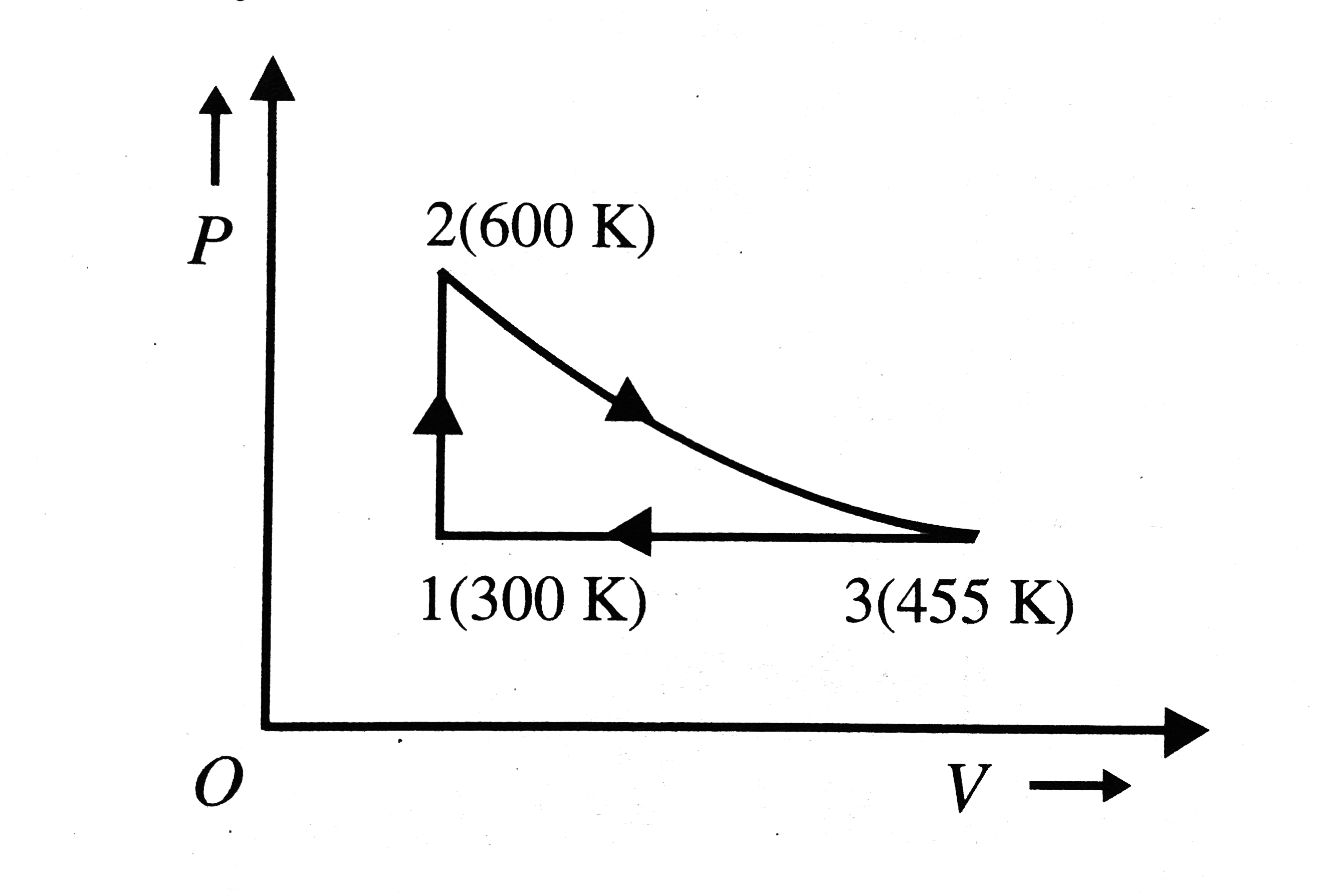An engine takes in 5 moles of air at 20∘C and 1 atm, and compresses it adiabaticaly to 1/10th of the original volume. Assuming air to be a diatomic ideal gas made up of rigid molecules, the change in its internal energy during this process comes out ot be X kj. The value of X to the nearest interger is ________.
To solve the problem, we need to find the change in internal energy (ΔU) of the air during an adiabatic compression process. Here are the steps to arrive at the solution:
Step 1: Convert Temperature to Kelvin
The initial temperature T1 is given as 20∘C. We need to convert this to Kelvin.
T1=20+273=293K
Step 2: Identify the Number of Moles
The number of moles n of air is given as:
n=5moles
Step 3: Determine the Specific Heat Capacity at Constant Volume (Cv)
For a diatomic ideal gas, the specific heat capacity at constant volume is given by:
Cv=52R
where R is the universal gas constant, approximately 8.314J/(mol⋅K).
Step 4: Calculate the Final Volume Ratio
The problem states that the gas is compressed to 110 of its original volume. Therefore, the volume ratio V2V1 is:
V2V1=110
Step 5: Apply the Adiabatic Condition
For an adiabatic process, the relationship between temperature and volume is given by:
T1Vγ−11=T2Vγ−12
where γ (the heat capacity ratio) for a diatomic gas is 75.
Step 6: Solve for T2
Rearranging the equation gives:
T2=T1(V1V2)γ−1
Substituting the values:
T2=293(10)75−1=293(10)25
Calculating 1025:
1025≈3.162
Thus,
T2≈293×3.162≈927.5K
Step 7: Calculate the Change in Temperature
The change in temperature ΔT is:
ΔT=T2−T1=927.5−293=634.5K
Step 8: Calculate the Change in Internal Energy (ΔU)
Using the formula for the change in internal energy:
ΔU=nCvΔT
Substituting the values:
Cv=52R=52×8.314≈20.785J/(mol⋅K)
Thus,
ΔU=5×20.785×634.5
Calculating this gives:
ΔU≈5×20.785×634.5≈65914.5J≈65.9kJ
Final Answer
Rounding to the nearest integer, the value of X is:
X≈66kJ
The initial temperature T1 is given as 20∘C. We need to convert this to Kelvin.
T1=20+273=293K
The number of moles n of air is given as:
n=5moles
For a diatomic ideal gas, the specific heat capacity at constant volume is given by:
Cv=52R
where R is the universal gas constant, approximately 8.314J/(mol⋅K).
The problem states that the gas is compressed to 110 of its original volume. Therefore, the volume ratio V2V1 is:
V2V1=110
For an adiabatic process, the relationship between temperature and volume is given by:
T1Vγ−11=T2Vγ−12
where γ (the heat capacity ratio) for a diatomic gas is 75.
Rearranging the equation gives:
T2=T1(V1V2)γ−1
Substituting the values:
T2=293(10)75−1=293(10)25
1025≈3.162
Thus,
T2≈293×3.162≈927.5K
The change in temperature ΔT is:
ΔT=T2−T1=927.5−293=634.5K
Using the formula for the change in internal energy:
ΔU=nCvΔT
Substituting the values:
Cv=52R=52×8.314≈20.785J/(mol⋅K)
Thus,
ΔU=5×20.785×634.5
Calculating this gives:
ΔU≈5×20.785×634.5≈65914.5J≈65.9kJ
Rounding to the nearest integer, the value of X is:
X≈66kJ
Topper's Solved these Questions
Similar Questions
A diesel engine takes in 1 mole of air at 300 K, 1 atm pressure and compresses it adiabatically to 132th of the original volume. Considering air as a diatomic ideal gas, the change in temperature is
View SolutionA gas expands against a constant pressure of 1 atm from a volume of 5L to 10L. During the process, system absorbs 400 J of heat from the surroundings. Calculate the change in the internal energy of the system.
View SolutionIn a container, two moles of a diatomic ideal gas is allowed to expand against 1atm pressrue & volume change from 2 litre of 5 litre then calculate change in internal energy.
View Solution500cm3 of a sample of an ideal gas is compressed by an average pressure of 0.1atm of 250cm3. During this process, 10J of heat flows out to the surroundings. Calculate the change in internal enegry of the system.
View Solution500cm3 of a sample of an ideal gas is compressed by an average pressure of 0.1atm of 250cm3. During this process, 10J of heat flows out to the surroundings. Calculate the change in internal enegry of the system.
View SolutionA diatomic gas which has initial volume of 10 liter is isothermally compressed to 1/15th of its original volume where initial pressure is 105 Pascal. If temperature is 27∘C then find the work done by gas
View SolutionAn ideal monoatomic gas initially in state 1 with pressure P1=20 atm and volume V11500cm3 it is then taken to state 2 with pressure P2=1.5P1 and volume V2=2V1 find the change in internal energy in this process in KJ. (take 1atm lit =100J)
View SolutionAn ideal gas at pressure 2.5×105 pa and temperature 300k occupies 100cc. It is adiabatically compressed to half its original volume. Calculate (a) the final pressure, (b) the final temperature and ( c) the work done by the gas in the process. Take (γ=1.5).
View SolutionAt 27∘C two moles of an ideal monatomic gas occupy a volume. V The gas expands adiabatically to a volume 2V. Calculate (i) Final temperature of the gas (ii) change its internal energy and (iiI) Workd done by the gas during this process. Given R=8.31J/molK,(2)2/3=1.587
View SolutionA reversible heat engine carries 1 mole of an ideal monatomic gas around the cycle 1-2-3-1. Process 1-2 takes place at constant volume, process 2-3 is adiabatic, and process 3-1 takes place at constant pressure. Complete the values for the heat ΔQ, the change in internal energy ΔU, and the work done Δ, for each of the three processes and for the cycle as a whole.

View Solution
